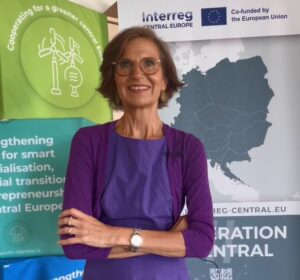We will soon offer new funding opportunities to our cities and regions to pioneer solutions for lagging and peripheral areas. Our third call for cooperation ideas has a specific focus, and Monika Schönerklee-Grasser, Head of the Project Unit – Strategy at our Programme Secretariat, provides insights into the decisions behind this call and the unique features of small-scale projects.

Q: What are the crucial differences in the third call compared to previous ones, and why was this specific call launched?
Monika: The main difference in the third call, which runs from 15 October to 10 December 2024, lies in its territorial and thematic focus, shorter project duration, and limited budget compared to previous classic calls. This time, we focus on four specific objectives:
- Strengthening skills for smart specialisation, industrial transition, and entrepreneurship (SO 1.2)
- Greening urban mobility (SO 2.5)
- Improving transport connections in rural and peripheral regions (SO 3.1)
- Strengthening governance for integrated territorial development (SO 4.1
- The key objective is to pioneer solutions in peripheral and lagging areas, addressing their unique challenges such as economic development, connectivity, access to services, and social cohesion. We believe that transnational cooperation is vital for counteracting these inequalities.
Q: The call aims to make peripheral and lagging areas more attractive to live and work in. What specific results are expected from the projects?
Monika: We expect local and regional pilot actions to be at the heart of the project proposals we receive. They should involve local and/or regional stakeholders and promote good governance through inclusive and participatory processes. Project results should have a local dimension, with clear benefits for local communities and target groups, possibly including citizens, in order to strengthen the territorial impact.
Q: What is the ideal partnership for such a project?
Monika: All types of institutions are eligible to participate in project proposals. But in line with the overall aim and territorial focus of the call, we strongly recommend prioritising the involvement of local and regional authorities or related institutions, associations, civil society, NGOs, and similar entities. The participation of research organisations should be limited, they should act mainly as knowledge providers or support local and regional actors.
Q: What support can small peripheral regions with no transnational experience expect?
Monika: Our programme offers a variety of support measures to newcomers. The Interreg CENTRAL EUROPE applicant community brings together organisations from across central Europe. It facilitates project partner search and presents already existing ideas. The platform is adapted to match the thematic focus of the call. In addition, it offers matchmaking possibilities, and an integrated video meeting tool allows members to conduct one-to-one meetings.
In our third call, individual consultations with the joint secretariat are compulsory for all proposals. These consultations provide technical advice to lead applicants on project contents, communications, and finances. They are based on a submitted project idea form through our applicant community. We recommend to request the consultation early in the project development stage.
Moreover, interested applicants can find video explainers introducing the territorial and thematic scope of the call and concrete actions that new projects are expected to address in their project application at our YouTube Channel.
Q: You’re introducing online hearings for shortlisted proposals. Can you explain this process?
Monika: A new element in the third call’s quality assessment is the introduction of online hearings for shortlisted proposals according to their quality based on the outcomes of the desk assessment. These hearings will allow applicants to further explain their proposals and answer questions resulting from the desk assessment. We expect each hearing to last not more than 20 minutes and they will be based on a pitch deck – a PowerPoint template provided by the programme.
Q: Given the significant interest in the preview webinar, do you expect strong participation in this call?
Monika: We have overall observed significant interest in this third call; however, it remains challenging to predict the exact number of proposals that will be submitted.
Q: Does the focus on peripheral and lagging areas or small-scale projects affect eligibility of partners?
Monika: In order to qualify for the territorial focus of the call, applicants have to demonstrate in the application form that the targeted areas are clearly matching with one or more of the three territorial characteristics: Low economic potential; Poor access to services of general interest (SGI), often affected by demographic change; Lack of relational proximity, decline in significance, influence or connectivity.
While the project partnership can be broader, it is essential to involve partners from territories that are relevant for implementing the foreseen activities and achieving the expected change in the targeted areas. We welcome partners previously involved in our classic project to take over the leading role in the new project proposal.
Q: The Interreg CENTRAL EUROPE Programme has launched a study to shape its future capitalisation call (4th call) to be launched in 2025. Can you share insights on the upcoming capitalisation call?
Monika: The main goal of our capitalisation call is to address disparities and border effects in central Europe. This will be achieved through the joint valorisation of existing solutions developed in transnational and cross-border cooperation projects. The aim is to enhance synergies and maximise impact on the ground.
We are in the process of developing the call and will debate the details and focus of the call in the coming months bringing transnational and cross-border actors together.
Q: What can we expect from the future of the programme? Are there any more calls being prepared?
Monika: With our third call for peripheral and lagging areas and our fourth capitalisation call, we do not anticipate any further calls in this programming period, as all available funding will have been allocated.
